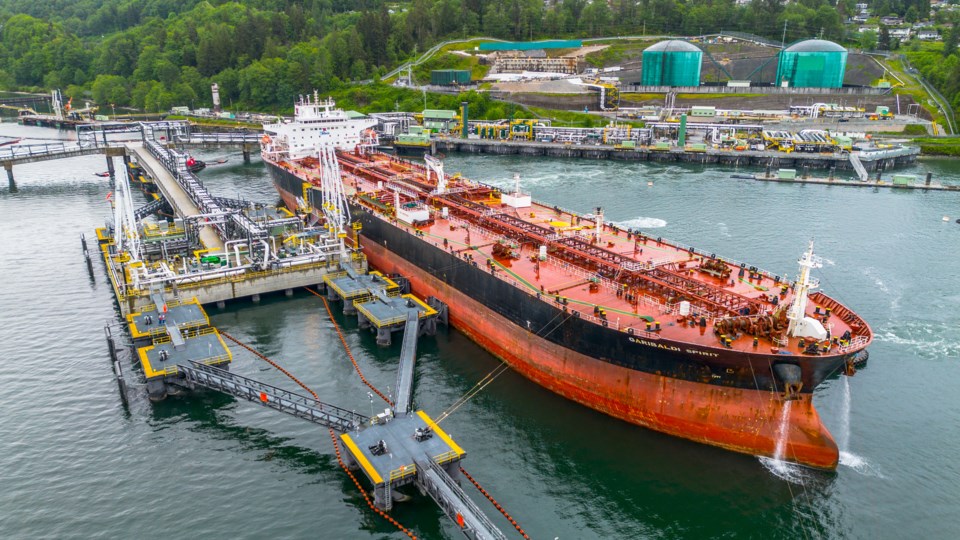Gasoline prices in Vancouver jumped roughly $0.11 per litre last week—well above the national average, according to GasBuddy—to reach $1.77 per litre.
That price was $0.24 above the cost per litre in Calgary, but $0.05 per litre lower than they were on the same day one year ago, GasBuddy noted.
While an escalating conflict between Israel and Iran and its proxies in the Middle East explains the recent surge in oil prices, which in turn affect gasoline prices, an expanded Trans Mountain pipeline may explain why gasoline prices in Vancouver last week were five cents lower than one year ago.
With pipeline capacity expanded from to 890,000 barrels per day from 350,000, Trans Mountain’s mainline is no longer over-subscribed.
In May, following the commissioning of the newly twinned pipeline, Trans Mountain Corp. announced zero apportionment on the pipeline for the first time in years, and at a presentation in Vancouver last week, Kent Fellows, an economist with the University of Calgary and a fellow-in-residence at the C.D. Howe Institute, explained what the means for gasoline prices in B.C.
In the last week of April 2024, before the new pipeline twin was commissioned, Vancouver’s rack (wholesale) prices averaged $0.45 per litre more than Edmonton’s, he said. In the last week of August 2024, Vancouver’s wholesale price was just $0.17 per litre more—a $0.28-per-litre change.
“As far as I can tell, the only thing driving that is the Trans Mountain expansion,” Fellows said.
The price paid at the pump is affected by numerous factors, including crude oil prices, which surged last week.
Gas prices are also affected by taxes, transportation costs and refining capacity. Taxes in Vancouver are disproportionately higher than almost every other city in Canada, but they alone never fully explained why Vancouver’s prices have been consistently higher for several years.
In 2019, the BC Utilities Commission (BCUC) was tasked with explaining why this was the case, and concluded there was an average “unexplained” difference of about $0.13 per litre between rack prices in Vancouver and Seattle, and similar disparities between Vancouver and Edmonton. It also found industry to be opaque, so the province passed the Fuels Transparency Act.
Since, the BCUC has noted a narrowing in the unexplained difference in gasoline prices. In December 2023, it reported that, between 2019 and 2022, the unexplained price difference in retail gas prices between B.C. and the rest of Western Canada had shrunk from nine cents to 3.5 cents per litre.
But there has been an even more stark wholesale price change since May. And coincidentally, Trans Mountain has had no apportionments since then.
Apportionment is the request for space shippers place on a pipeline in excess of its available capacity. For the past several years, it was routine for Trans Mountain to announce pipeline apportionments of 10 to 20 per cent, meaning shippers were getting 10 to 20 per cent less in volume allocations than they asked for.
There has been zero apportionment on the pipeline since May, and the pipeline has been running at about 80 per cent capacity, said Jason Balasch, vice-president of business development and commercial services for Trans Mountain Corp. Shippers have been getting all the volume they have asked for. Refined fuel volumes (gasoline and diesel) on the pipeline have increased from 20,000 to 35,000 barrels per day pre-expansion, to 43,000 to 44,000 barrels per day post-expansion—a 25-per-cent increase, Balasch said.
As for crude oil, exports via tanker have increased from two to three per month pre-expansion to 21 per month (90 between May and September), said Balasch.
In 2008, shippers’ requests for capacity on the pipeline (nominations) began exceeding capacity. The National Energy Board (NEB) started rationing space, which led to shippers gaming the system with strategic over-nominations, Fellows said, in attempts to secure space.
By 2015, the NEB adopted a new apportionment process, which ended up favouring crude oil shippers at the expense of refined fuel ones. The percentage of refined fuels on the pipeline began to shrink.
Before 2015, the wholesale price difference between Vancouver and Edmonton—adjusting for toll charges—was less than $0.10 per litre, Fellows noted in a recent C.D. Howe report. By 2023, it was $0.23 to $0.35 per litre. Following the pipeline expansion, Fellows said it has dropped from to $0.17 per litre.
Fellows said the recent narrowing of the price differential between Vancouver and Edmonton for rack prices is because of additional pipeline capacity.
“We’re not back to the pre-2015 levels yet,” he said. “We’ve got pretty dramatic evidence that that additional pipeline capacity has allowed for more refined product shipments.”
BCUC commissioner Mark Jaccard said he invited Fellows to speak to the BCUC’s fuel transparency team about his findings.
“I think it’s fascinating what he’s exploring, and I think we’re going to get a nice test of that over the next couple of years,” Jaccard said.
“At the same time, it doesn’t look like it can be the only explainer.”





